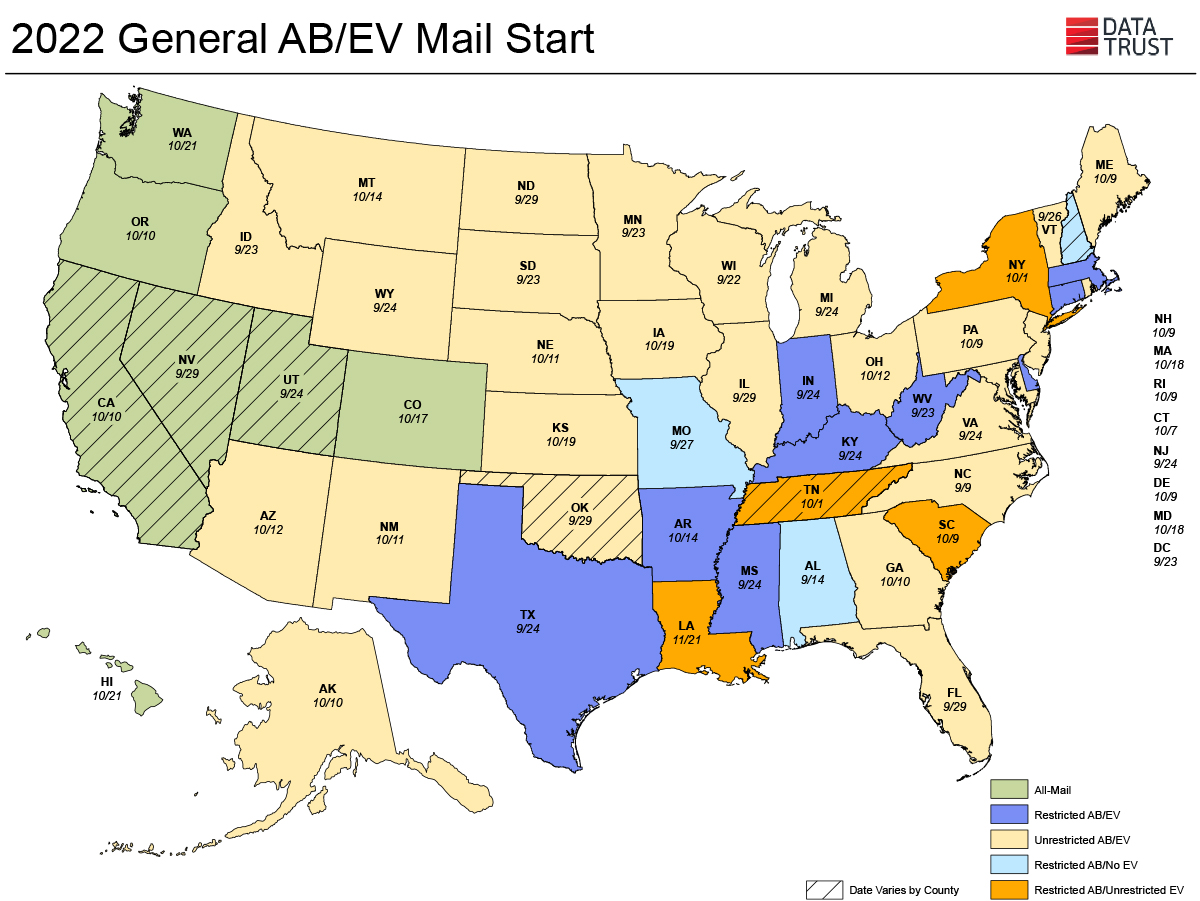As Election Day approaches, Data Trust is working hard to collect and organize Absentee and Early Vote (AB/EV) data. We recently sat down with Josh, who leads our Data Acquisition team that is responsible for making sure this process runs smoothly.
Abby: Thanks for joining us Josh. To kick off this conversation, can you explain to our audience what Absentee and Early Vote data entails?
Josh: For sure. Across the nation, states use different terms for Absentee and Early Voting. Some use the term ‘Vote by Mail’, while others have ‘All Mail Elections’ where every registered voter is mailed a ballot regardless of if they request one. A majority of states simply use the term ‘Absentee’. Early voting, if it is within a state’s laws, can either be defined as In-Person Absentee, Voting Early In-Person, Advanced Voting, or Early Voting.
In addition to the terminology, the actual process of voting absentee can be more difficult in certain states than in others. Some have restrictions on absentee voting where only a certain population of the voting base may request and vote absentee. Texas, for example, only allows those with certain medical histories or those over the age of 65 to vote absentee by mail. However, most states have unrestrictive pre-election day voting.
Absentee and Early Vote data are lists provided by various State and County offices across the country that contain voters who have requested or been sent a mail ballot, or voted early in-person. Depending on the state and their specific absentee mail ballot and early vote laws, the files will differ between which kind and what type of information is provided. Typically, these files will arrive in .CSV, .TXT, or Excel format. These are the preferred formats of absentee data that allow us to process the data we need in a clean and efficient manner.
Abby: Can you talk a bit about what your department does and the process of collecting the AB/EV data?
Josh: Our primary job is to be in communication with the secretary of state offices. Over the years, we have cultivated contacts in these offices which makes requesting this information a bit easier. Based on the office, the dates for collecting this data vary. Once we receive the data, our team processes the data, making sure the information we send out is standardized.

Abby: What is difficult about this process?
Josh: A lot of times, the county collections are the most difficult part of the process. You may get someone in a county office that doesn’t have any technical data experience. This is problematic when the data they send to us contains errors, and frankly we can’t do much until they fix it. That can cause major delays in accessing the information.
Another difficulty occurs when the source file indicates dates that haven’t happened yet. They are anticipating sending out the ballots but haven’t yet done so, a distinction that needs to be recognized when looking at the data.
Other times, states will just give voter IDs without names or addresses which means we cannot always get detailed ballot data.
Finally, it is important to understand state laws with reference to early voting. For instance, what do states qualify as early voting? How do they code it? Knowing the answers to these questions helps eliminate confusion down the line.
Abby: From what you are saying, it appears that, depending on the origin of the data, it can either be easy or difficult to process. Can you give an example of a state that provides ‘clean’ data and one that provides ‘dirty’ data?
Josh: North Carolina is one example of a state that provides ‘clean’ data. We visit the website every day and can download the files on a consistent basis. However, there are counties in New York, for instance, that will send the data in three different file formats. This is difficult because we have a certain system in place for downloading the files and obtaining the information. Additionally, we often have to run a fuzzy match against our voter file in order to gather all of the information needed.
Abby: That is really interesting. Well, that is all we have for today but we appreciate you explaining all of this and thank you for your time!
Josh: Happy to be here!